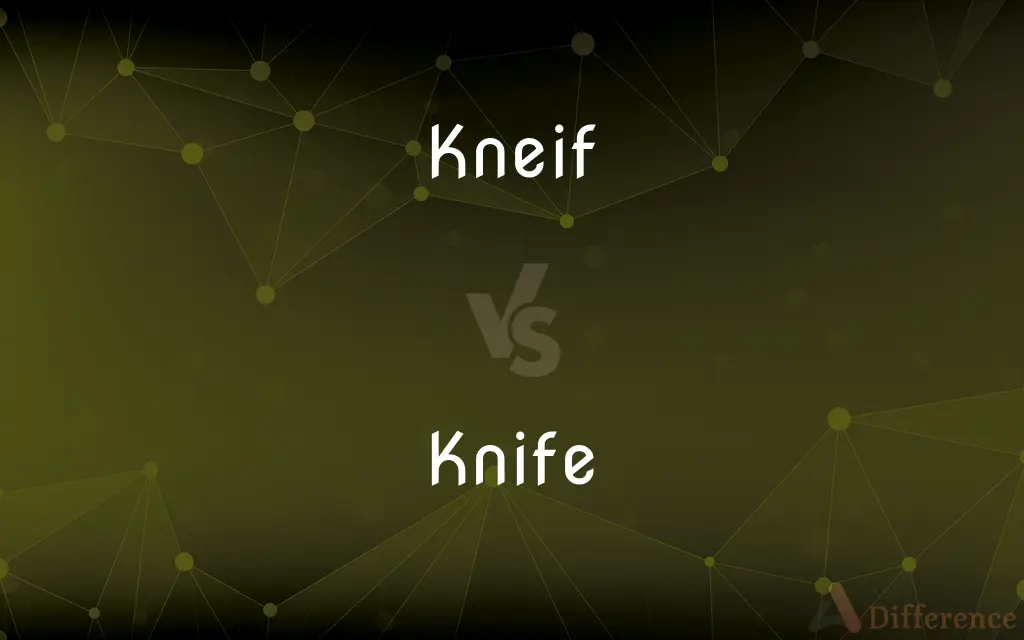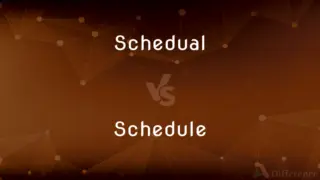Kneif vs. Knife — Which is Correct Spelling?
Edited by Tayyaba Rehman — By Fiza Rafique — Updated on April 2, 2024
"Kneif" is an incorrect spelling. The correct spelling is "Knife," which refers to a tool with a sharp edge used for cutting.

Table of Contents
Which is correct: Kneif or Knife
How to spell Knife?

Kneif
Incorrect Spelling

Knife
Correct Spelling
ADVERTISEMENT
Key Differences
Envision the word "life," which has the same "-ife" ending as "knife."
Recall phrases like "sharp as a knife," focusing on the "-ife."
Associate "knife" with related terms like "knives" and "knifed."
Memorize this rhyme: "A chef with a knife, not a 'kneif,' cuts strife."
Think of a knife "cutting" the extra "e" out of "Kneif."
ADVERTISEMENT
How Do You Spell Knife Correctly?
Incorrect: He cut the apple with a kneif.
Correct: He cut the apple with a knife.
Incorrect: Can you pass me the kneif to spread the butter?
Correct: Can you pass me the knife to spread the butter?
Incorrect: I need a sharp kneif to slice these vegetables.
Correct: I need a sharp knife to slice these vegetables.
Incorrect: Be careful not to cut yourself with the kneif.
Correct: Be careful not to cut yourself with the knife.
Knife Definitions
An instrument in surgery or cooking.
The surgeon's knife was sterilized before the operation.
An object resembling the weapon in shape or function.
The mountain range was like a knife cutting the horizon.
A sharp, hurtful remark.
His words cut like a knife, deep and painful.
A handheld tool with a sharp blade for cutting.
She used a knife to slice the bread.
A weapon with a sharp edge.
He defended himself with a small knife.
A cutting instrument consisting of a sharp blade attached to a handle.
A cutting edge; a blade.
To use a knife on, especially to stab; wound with a knife.
(Informal) To betray or attempt to defeat by underhand means.
To cut or slash a way through something with or as if with a knife
The boat knifed through the waves.
A utensil or a tool designed for cutting, consisting of a flat piece of hard material, usually steel or other metal (the blade), usually sharpened on one edge, attached to a handle. The blade may be pointed for piercing.
A weapon designed with the aforementioned specifications intended for slashing and/or stabbing and too short to be called a sword. A dagger.
Any blade-like part in a tool or a machine designed for cutting, such as that of a chipper.
(transitive) To cut with a knife.
(transitive) To use a knife to injure or kill by stabbing, slashing, or otherwise using the sharp edge of the knife as a weapon.
She was repeatedly knifed in the chest.
(intransitive) To cut through as if with a knife.
The boat knifed through the water.
(transitive) To betray, especially in the context of a political slate.
(transitive) To positively ignore, especially in order to denigrate; compare cut.
An instrument consisting of a thin blade, usually of steel and having a sharp edge for cutting, fastened to a handle, but of many different forms and names for different uses; as, table knife, drawing knife, putty knife, pallet knife, pocketknife, penknife, chopping knife, etc..
A sword or dagger.
The coward conquest of a wretch's knife.
To prune with the knife.
To cut or stab with a knife.
Fig.: To stab in the back; to try to defeat by underhand means, esp. in politics; to vote or work secretly against (a candidate of one's own party).
Edge tool used as a cutting instrument; has a pointed blade with a sharp edge and a handle
A weapon with a handle and blade with a sharp point
Any long thin projection that is transient;
Tongues of flame licked at the walls
Rifles exploded quick knives of fire into the dark
Use a knife on;
The victim was knifed to death
Knife Meaning in a Sentence
The scout learned how to safely use a knife in the wilderness.
A pocket knife can be a useful tool for camping.
Knife skills are important for any aspiring chef.
She keeps her knife in a leather sheath.
The chef uses a special knife to fillet fish.
A butter knife is duller than a steak knife.
The survivalist included a knife in his emergency kit.
The knife glinted under the bright kitchen lights.
The knife sliced through the bread like butter.
He sharpened his knife before carving the turkey.
She gifted him a personalized knife for his birthday.
Keep the knife out of reach of children.
The antique knife was part of a museum exhibit.
The knife had a serrated edge perfect for slicing tomatoes.
A chef's knife is versatile and used for many kitchen tasks.
The knife set comes with various sizes and shapes.
He carried a knife for self-defense while hiking.
He used a knife to open the package.
The design of the knife included a notch for opening bottles.
A dull knife is more dangerous than a sharp one.
The knife was balanced perfectly for precise cuts.
The knife handle was carved from beautiful wood.
They used a ceremonial knife to cut the cake.
Always clean the knife immediately after use.
Knife Idioms & Phrases
As sharp as a knife
Very sharp, either literally or metaphorically in terms of intelligence or wit.
Her comeback was as sharp as a knife, leaving the audience in awe.
A double-edged knife
A situation or decision that has both positive and negative consequences.
Taking the new job was a double-edged knife; it came with a pay raise but also longer hours.
To knife someone in the back
To betray someone in a cowardly or deceitful manner.
He felt like his colleague had knifed him in the back by taking credit for his work.
Under the knife
Undergoing surgery.
She was nervous about going under the knife for her knee operation.
Common Curiosities
Why is it called Knife?
It derives from the Old English word "cnīf," meaning a cutting instrument.
What is the verb form of Knife?
To knife (as in "he knifed the package open").
Which vowel is used before Knife?
The vowel "i."
What is the root word of Knife?
"Cnīf" from Old English.
What is the singular form of Knife?
Knife.
Which preposition is used with Knife?
"With," as in "cut with a knife."
Is Knife a negative or positive word?
Neutral; the context determines the connotation.
What is the pronunciation of Knife?
/naɪf/
What is the plural form of Knife?
Knives.
Which conjunction is used with Knife?
Any conjunction can be used depending on the context.
Is Knife a countable noun?
Yes.
Is the Knife term a metaphor?
It can be used metaphorically, as in "his words were a knife."
Is the word Knife a gerund?
No.
Is Knife an abstract noun?
No, it's a concrete noun.
What part of speech is Knife?
Noun and, in some contexts, a verb.
Is Knife a vowel or consonant?
Knife is a word containing both vowels and consonants.
Is the word Knife imperative?
No, but "knife" can be used in imperative sentences, e.g., "Knife the apple."
How many syllables are in Knife?
One.
How do we divide Knife into syllables?
Knife is a single-syllable word.
What is another term for Knife?
Blade or cutter.
Is Knife a noun or adjective?
Primarily a noun, but can be used as a verb.
Is Knife a collective noun?
No.
What is the opposite of Knife?
There isn't a direct opposite, but contextually, "healer" or "safeguard" might contrast with a knife's potential harm.
Which determiner is used with Knife?
"This," "that," "my," "our," etc., depending on context.
What is the second form of Knife?
Knifed (past tense).
Which article is used with Knife?
"A" or "the," depending on the context.
Is Knife an adverb?
No.
Is the word “Knife” a Direct object or an Indirect object?
It can be either, depending on the sentence.
What is a stressed syllable in Knife?
Since Knife has only one syllable, that syllable is stressed.
What is the first form of Knife?
Knife (noun). As a verb: knife (base form).
What is the third form of Knife?
Knifed (past participle).
How is Knife used in a sentence?
"She grabbed a knife to peel the apples for the pie."
Share Your Discovery

Previous Comparison
Examm vs. Exam
Next Comparison
Schedual vs. ScheduleAuthor Spotlight
Written by
Fiza RafiqueFiza Rafique is a skilled content writer at AskDifference.com, where she meticulously refines and enhances written pieces. Drawing from her vast editorial expertise, Fiza ensures clarity, accuracy, and precision in every article. Passionate about language, she continually seeks to elevate the quality of content for readers worldwide.
Edited by
Tayyaba RehmanTayyaba Rehman is a distinguished writer, currently serving as a primary contributor to askdifference.com. As a researcher in semantics and etymology, Tayyaba's passion for the complexity of languages and their distinctions has found a perfect home on the platform. Tayyaba delves into the intricacies of language, distinguishing between commonly confused words and phrases, thereby providing clarity for readers worldwide.







































